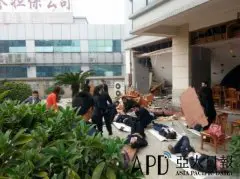The U.S.-led airstrikes on Saturday joined by France and Britain made good word on U.S. President Donald Trump's threat earlier in the week, but analysts predicted to see no escalated response or destabilization in the region.
Despite damage of Syrian regimes facilities, Imad Salamay, director of the Institute for Social Justice and Conflict Resolution at the Lebanese American University said the airstrikes "will not bring major political consequences."
"Neither Russia nor Iran wants to escalate the situation, as both countries are under serious scrutiny by the international community. They are fighting on so many fronts," Salamay said.
Targeting the Syrian regime around dawn, over 100 missiles struck research centers, military and storage sites in Damascus as a response to alleged chemical attacks carried out by the Syrian government in Douma about a week prior.
President Trump announced the offense from the White House, calling it a "strong deterrent against the production, spread and use of chemical weapons."
He concluded his brief message explicitly singling out Russia and Iran for being associated with a nation carrying out "the mass murder of innocent men, women and children."
Despite brewing tensions between the West and Russia, Salamay did not predict severe responses between the rivaling powers.
"The only significance of this attack is that a stronger military alliance has been built between Britain, France and the United States. They have taken on more aggressive military positions, strengthening their coalition with clear intention to curb and contain Russian militaries expansion and influence in the region."
According to the professor, Saturday's attacks serve as a message against Russia's growing influence and military expansion in the region.
Calling the attacks "narrowly targeted," Sam Heller, senior fellow at the International Crisis Group, pointed out that no "major break" has occurred in the immediate aftermath of the bombings.
"We'll have to see whether that effectively communicates a deterrent message, or if the Syrian government reads the strikes' limited scope as evidence of a lack of will and seriousness."
As for Russia and Iran, Heller described it only as a waiting game.
"We'll have to see how they choose to react."
The alleged chemical attack in Syria's Douma reached a reported death toll of over 40 individuals, according to humanitarian workers and medics. It was immediately denounced by the United Nations as any use of chemical weaponry is a violation of international law.
Both the United States and Britain have claimed to have proof that Syria is responsible for the chemical attack. On Saturday, France released a declassified intelligence report based upon open sources and intelligence pointing a finger at the Syrian regime.
Following suit with previous chemical incidents, Assad has repeatedly denied the allegations. Its Russian ally took a more provocative stance, pointing its finger at Britain for "staging" the attacks.
However, no international investigation has yet to take place as Russia and western allies are unable to agree on a response.
Concerning the regimes battle over Syria's last rebel-held areas, Saturday's strikes will likely not see a dramatic affect on their strategies, Salamay said.
"In Syria, the war will rage on. The Syrian regime will continue to attack. It may make them more cautious in terms of the weapons they choose to use if indeed they have been the ones responsible for past chemical attacks. But still, they wouldn't change the battle inside Syria," he added.
While the West proclaimed success of the airstrike with Trump tweeting "Mission Accomplished," Damascus sent its own message remaining defiant with public nationalistic gathering. Soldiers and civilians were captured waving Syrian flags, dancing and laughing at dawn.
The Syrian Presidency tweeted that "honorable souls cannot be humiliated," with a photo of a soldier next to the Syrian flag waving off any setbacks the attacks had brought.
(ASIA PACIFIC DAILY)
 简体中文
简体中文

